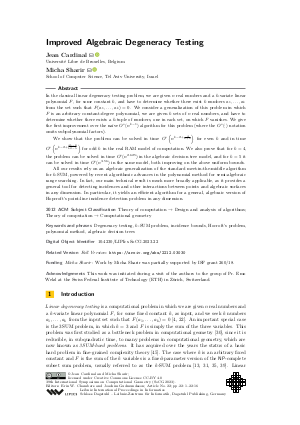@InProceedings{cardinal_et_al:LIPIcs.SoCG.2023.22,
author = {Cardinal, Jean and Sharir, Micha},
title = {{Improved Algebraic Degeneracy Testing}},
booktitle = {39th International Symposium on Computational Geometry (SoCG 2023)},
pages = {22:1--22:16},
series = {Leibniz International Proceedings in Informatics (LIPIcs)},
ISBN = {978-3-95977-273-0},
ISSN = {1868-8969},
year = {2023},
volume = {258},
editor = {Chambers, Erin W. and Gudmundsson, Joachim},
publisher = {Schloss Dagstuhl -- Leibniz-Zentrum f{\"u}r Informatik},
address = {Dagstuhl, Germany},
URL = {https://drops-dev.dagstuhl.de/entities/document/10.4230/LIPIcs.SoCG.2023.22},
URN = {urn:nbn:de:0030-drops-178723},
doi = {10.4230/LIPIcs.SoCG.2023.22},
annote = {Keywords: Degeneracy testing, k-SUM problem, incidence bounds, Hocroft’s problem, polynomial method, algebraic decision trees}
}

 Creative Commons Attribution 4.0 International license
Creative Commons Attribution 4.0 International license
